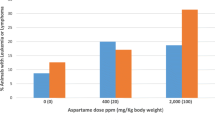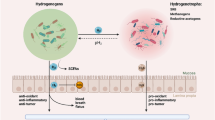Abstract
Radiotherapy and chemotherapy are the main therapeutic approaches for patients with malignant tumours, especially advanced tumours. However, they can cause adverse effects, one of which is gastrointestinal mucosal damage, which can greatly affect patients’ quality of life. Until now, there have been no effective therapies to avoid or treat these adverse effects. In this study, we used attenuated Salmonella typhimurium (S. typhimurium) to deliver the hepatocyte growth factor (HGF) or keratinocyte growth factor (KGF) to murine gastrointestinal mucosa. We found that attenuated S. typhimurium carrying the HGF or KGF genes can effectively reduce the ratio of tumour to non-tumour carcass weight, repair damage to the gastrointestinal mucosal from chemotherapy, improve the immune response, and reduce the mortality rate of mice. Oral administration of attenuated S. typhimurium with HGF and KGF may be promising as a way of improving the quality of life of patients undergoing radiotherapy and chemotherapy.




Similar content being viewed by others
References
Keefe DM, Brealey J, Goland GJ, Cummins AG. Chemotherapy for cancer causes apoptosis that precedes hypoplasia in crypts of the small intestine in humans. Gut. 2000;47:632–7.
Love RR, Leventhal H, Easterling DV, Nerenz DR. Side effects and emotional distress during cancer chemotherapy. Cancer. 1989;63:604–12.
Orazi A, Du X, Yang Z, Kashai M, Williams DA. Interleukin-11 prevents apoptosis and accelerates recovery of small intestinal mucosa in mice treated with combined chemotherapy and radiation. Lab Invest. 1996;75:33–42.
Minicucci EM, Ribeiro DA, de Camargo B, Costa MC, Ribeiro LR, Favero Salvadori DM. DNA damage in lymphocytes and buccal mucosa cells of children with malignant tumours undergoing chemotherapy. Clin Exp Med. 2008;8:79–85.
Potten CS, Merritt A, Hickman J, Hall P, Faranda A. Characterization of radiation-induced apoptosis in the small intestine and its biological implications. Int J Radiat Biol. 1994;65:71–8.
Rose-Ped AM, Bellm LA, Epstein JB, Trotti A, Gwede C, Fuchs HJ. Complications of radiation therapy for head and neck cancers. The patient’s perspective, Cancer Nurs. 2002;25:461–7. quiz 468–469.
Navari RM, Kaplan HG, Gralla RJ, Grunberg SM, Palmer R, Fitts D. Efficacy and safety of granisetron, a selective 5-hydroxytryptamine-3 receptor antagonist, in the prevention of nausea and vomiting induced by high-dose cisplatin. J Clin Oncol. 1994;12:2204–10.
Hickok JT, Roscoe JA, Morrow GR, King DK, Atkins JN, Fitch TR. Nausea and emesis remain significant problems of chemotherapy despite prophylaxis with 5-hydroxytryptamine-3 antiemetics: a University of Rochester James P. Wilmot Cancer Center Community Clinical Oncology Program Study of 360 cancer patients treated in the community. Cancer. 2003;97:2880–6.
Garner A, Fadlallah H, Parsons ME. 1976 and all that!—20 years of antisecretory therapy. Gut. 1996;39:784–6.
Wilder-Smith CH, Halter F, Merki HS. Tolerance and rebound to H2-receptor antagonists: intragastric acidity in patients with duodenal ulcer. Dig Dis Sci. 1991;36:1685–90.
Weimar IS, Miranda N, Muller EJ, Hekman A, Kerst JM, de Gast GC, Gerritsen WR. Hepatocyte growth factor/scatter factor (HGF/SF) is produced by human bone marrow stromal cells and promotes proliferation, adhesion and survival of human hematopoietic progenitor cells (CD34 +). Exp Hematol. 1998;26:885–94.
Warn R, Harvey P, Warn A, Foley-Comer A, Heldin P, Versnel M, Arakaki N, Daikuhara Y, Laurent GJ, Herrick SE, Mutsaers SE. HGF/SF induces mesothelial cell migration and proliferation by autocrine and paracrine pathways. Exp Cell Res. 2001;267:258–66.
Farrell CL, Bready JV, Rex KL, Chen JN, DiPalma CR, Whitcomb KL, Yin S, Hill DC, Wiemann B, Starnes CO, Havill AM, Lu ZN, Aukerman SL, Pierce GF, Thomason A, Potten CS, Ulich TR, Lacey DL. Keratinocyte growth factor protects mice from chemotherapy and radiation-induced gastrointestinal injury and mortality. Cancer Res. 1998;58:933–9.
Dignass AU, Lynch-Devaney K, Podolsky DK. Hepatocyte growth factor/scatter factor modulates intestinal epithelial cell proliferation and migration. Biochem Biophys Res Commun. 1994;202:701–9.
Wilson SE, He YG, Weng J, Zieske JD, Jester JV, Schultz GS. Effect of epidermal growth factor, hepatocyte growth factor, and keratinocyte growth factor, on proliferation, motility and differentiation of human corneal epithelial cells. Exp Eye Res. 1994;59:665–78.
Yang H, Cao S, Huang X, Liu J, Tang Y, Wen X. Intragastric administration of attenuated Salmonella typhimurium harbouring transmissible gastroenteritis virus (TGEV) DNA vaccine induced specific antibody production. Vaccine. 2009;27:5035–40.
Garmory HS, Titball RW, Griffin KF, Hahn U, Bohm R, Beyer W. Salmonella enterica serovar typhimurium expressing a chromosomally integrated copy of the Bacillus anthracis protective antigen gene protects mice against an anthrax spore challenge. Infect Immun. 2003;71:3831–6.
Yu X, Jia R, Huang J, Shu B, Zhu D, Liu Q, Gao X, Lin M, Yin Z, Wang M, Chen S, Wang Y, Chen X, Cheng A. Attenuated Salmonella typhimurium delivering DNA vaccine encoding duck enteritis virus UL24 induced systemic and mucosal immune responses and conferred good protection against challenge. Vet Res. 2012;43:56.
Darji A, Guzman CA, Gerstel B, Wachholz P, Timmis KN, Wehland J, Chakraborty T, Weiss S. Oral somatic transgene vaccination using attenuated S. typhimurium. Cell. 1997;91:765–75.
Lindgren A, Yun CH, Lundgren A, Sjoling A, Ohman L, Svennerholm AM, Holmgren J, Lundin SB. CD8-natural killer cells are greatly enriched in the human gastrointestinal tract and have the capacity to respond to bacteria. J Innate Immun. 2010;2:294–302.
Ishigami S, Natsugoe S, Tokuda K, Nakajo A, Che X, Iwashige H, Aridome K, Hokita S, Aikou T. Prognostic value of intratumoural natural killer cells in gastric carcinoma. Cancer. 2000;88:577–83.
Valentine PJ, Devore BP, Heffron F. Identification of three highly attenuated Salmonella typhimurium mutants that are more immunogenic and protective in mice than a prototypical aroA mutant. Infect Immun. 1998;66:3378–83.
Acknowledgments
This work was supported by the National Natural Science Foundation of China (No. 81071839) and Capital Medical Development Foundation of China (2007–2040).
Conflict of interest
All authors have declared no conflict of interest.
Author information
Authors and Affiliations
Corresponding author
Additional information
Jun-zhong Sun and Xiao-qin Ha contributed equally to this work.
Rights and permissions
About this article
Cite this article
Sun, Jz., Ha, Xq., Zhang, Lm. et al. Attenuated Salmonella typhimurium carrying the hepatocyte growth factor and keratinocyte growth factor genes repairs gastrointestinal mucosal damage caused by chemotherapy. Med Oncol 30, 453 (2013). https://doi.org/10.1007/s12032-012-0453-z
Received:
Accepted:
Published:
DOI: https://doi.org/10.1007/s12032-012-0453-z




